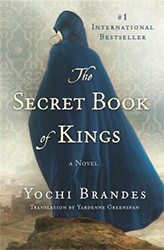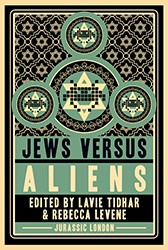
Noah Beit-Aharon is the nice Jewish boy behind the Godserfs epic fantasy series, published under the penname N. S. Dolkert. With the release of Among the Fallen, the second volume in the series, Noah is guest blogging for the Jewish Book Council all week as part of the Visiting Scribe series here on The ProsenPeople.
(Author’s note: in this essay, I use male pronouns while discussing the God of the Tanakh. I do this not because I believe that God is male, but because I am talking specifically about the Tanakhic God, and the Tanakh uses male pronouns.)
The setting of my fantasy series Godserfs is heavily influenced by my reading of the Tanakh, and the world evoked by the many conflicting stories and traditions within that text. While the first two books, Silent Hall and Among the Fallen, are rife with allusions and reimaginings, I want to take the opportunity to discuss three passages in the Hebrew Bible that directly influenced my writing.
Before we even begin, it is important to note that the Tanakh accepts and assumes the existence of multiple gods, besides the one “true” God. In Exodus 12:12, God says to Moses: “I will bring judgment on all the gods of Egypt.” Numbers 33:4 confirms that God “executed judgments against their gods.” These other unnamed gods are less awesome (e.g. Psalms 86:8, “Among the gods there is none like you, Lord”), but they’re around, opposing our God and each other, and generally doing no good in the world.
This is also the case in my series, where the characters begin their journeys as polytheists completely unaware of God Most High, in this case the ancient god of the dragons. That god may turn out to be more powerful than all the other ones, as the name would imply, but the others are the ones that my main characters have to worry about. It’s unclear whether God Most High will protect them, or is even watching them at all. The Cartesian ideal of God as omniscient, omnipotent and omnibenevolent does not apply to the world of Silent Hall and Among the Fallen, any more than it applies to the world depicted in Exodus or Kings. At any time, God Most High might not be watching, might not be able to do anything about the characters’ problems, or might not care to.
⚔⚔⚔
A biblical passage that particularly stands out as inspiration for the setting of the Godserfs series is this one from Exodus 32, where God sees the golden calf that the Israelites have made and decides He’s done with them:
Now leave me alone, (He says to Moses in verse 10,) so that my anger can blaze against them, and I can put an end to them! I will make a great nation out of you instead.
This passage echoes the Abrahamic covenant, but with a very dark message: if made sufficiently angry, God is willing to discard His own people. For all the promises to the avot (our forefathers Abraham, Isaac, and Jacob) that He would make them a great nation, the fact is that the Israelites are just a means to an end, and God is willing to start over with one or two of them as many times as He has to.
⚔⚔⚔
Hopping backwards a bit, let’s look at one of the strangest and most confusing scenes in the entire Bible, Exodus 4:24 – 26: And it came to pass on the way at the lodging-place, that the Lord met [Moses] and sought to kill him. Then Zipporah took a flint and cut off the foreskin of her son, and cast it at his feet, and she said: “Surely a bridegroom of blood art thou to me.” So He let him alone. Then she said: “A bridegroom of blood in regard of the circumcision.”
This bizarre passage, known as the Bridegroom of Blood episode, has befuddled commentators for centuries. These verses come immediately after God finishes giving Moses instructions on how to speak to Pharaoh — so why, after spending all this time grooming Moses to be His servant and messenger, would God suddenly seek to kill him? How does Moses’ wife Zipporah know that circumcising their son is the appropriate response, and just as importantly, why is it the appropriate response? Does God seriously mean to kill Moses for neglecting to circumcise his son?
The God in this passage is more than just mysterious, He’s terrifyingly fickle. He may talk to you one moment and smite you the next over something as small as a foreskin. I imagine the panic that Moses must have felt, not knowing what he’d done wrong or how to atone for it until his wife took over and saved the day.
I brought this mental image to my first novel, where a character who has inadvertently slighted a god is pursued through the woods and begins desperately trying to atone for whatever it is he’s done. I don’t want to give any spoilers, but here, too, the insult turns out to be small and strange. It takes some time to discover what my character has done to insult this god, especially since, like Moses, he’s already committed a murder.
(People forget that about Moses, but I think you can see why it’s Zipporah and not him who figures out the circumcision thing. When you’ve left your homeland because you killed a man, it’s kind of hard to go, “Oh, God must be mad because I neglected to circumcise my son.”)
If there is any lesson to be drawn from these first two passages, it is that divine jealousy plus inscrutability equals a very frightening world for its inhabitants. Such is the world my characters inhabit.
⚔⚔⚔
There is one last biblical passage that bears mentioning. From Numbers 10:35:
Whenever the ark set out, Moses said: Rise up, Lord, and your enemies shall scatter, your foes shall flee before you.
This exhortation is crucial in the Jewish liturgy: we hear this passage whenever the Torah scroll comes out of the ark on the Sabbath, holy days, and before weekday readings. As Jon D. Levenson points out in his excellent scholarly work, Creation and the Persistence of Evil, the use of the imperative is crucial in our understanding of ancient Israelite religion. The continued existence of Israel’s enemies — and, by extension, God’s enemies — is seen as evidence of God’s delinquency, not His weakness or lack of existence or “working in mysterious ways.” The purpose of prayer is to shake God from His divine complacency and convince Him to help out.
This is also the quest undertaken by the characters of Silent Hall: to “awaken” the only god that can save them from their enemies. That god isn’t really asleep, of course, but that doesn’t make their quest any easier. They still have to get God Most High off the couch, as it were.
For those who love Bible-reference treasure hunts almost as much as they like fantasy novels, take heart: other parallels and allusions to midrash, the Talmud, and Jewish history are sprinkled throughout. But if I had to choose just one lesson readers should take away from my writing, it’s this: the Bible is a scary place to live.
Noah Beit-Aharon lives in Waltham, MA, and is a member of Temple Beth Israel in Waltham. The first two installments of his Jewish-inspired epic fantasy series Godserfs, published under the pen name N. S. Dolkart, are available in paperback from Angry Robot Books.



